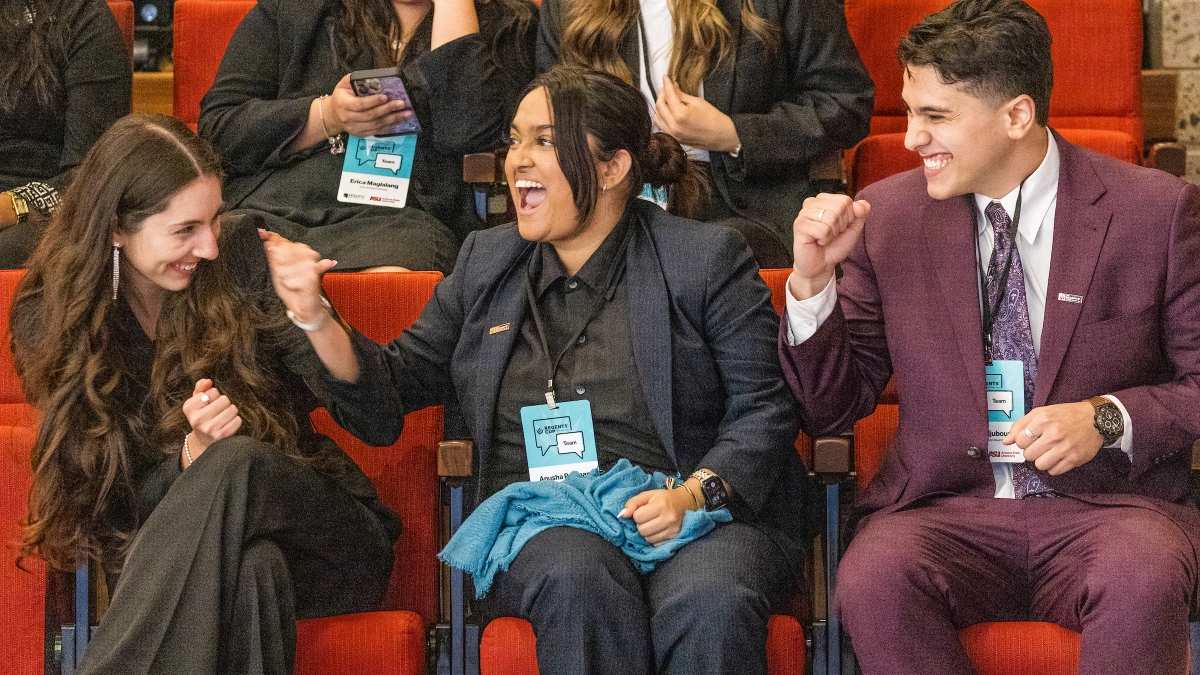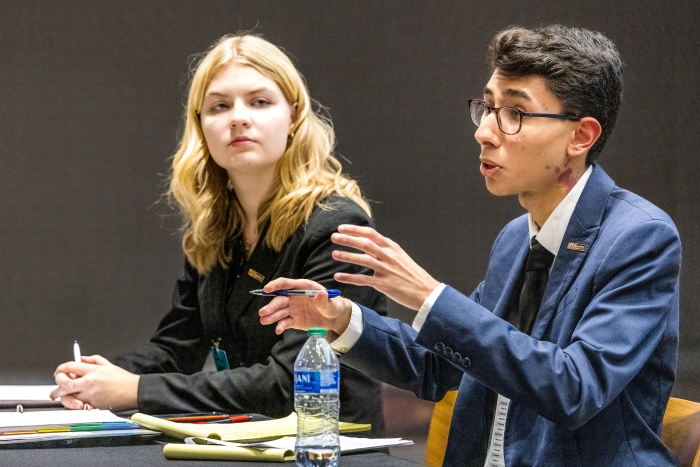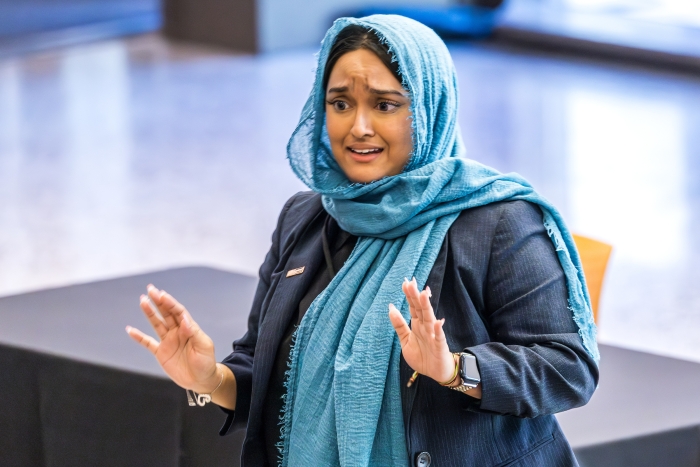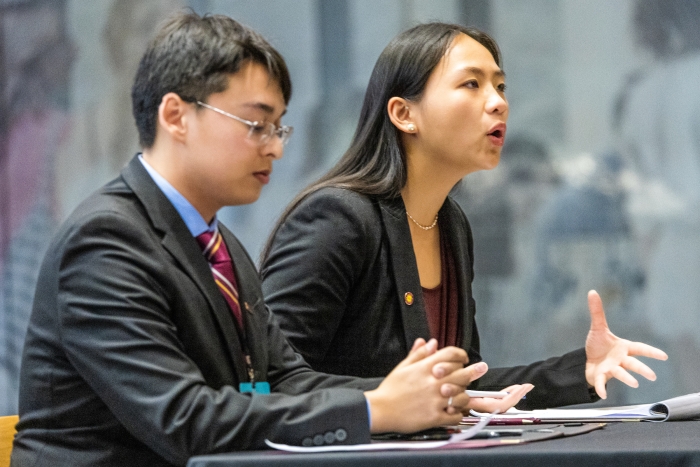ASU students sweep debate, storytelling categories in 2024 Regents' Cup

From left: Arizona State University students Isabella Meadows, Anusha Rahman and Omar Aljubouriy celebrate after completing the final round in the fifth Regents' Cup on Saturday, March 23, at the Downtown Phoenix campus. Photo by Charlie Leight/ASU News
Arizona State University reclaimed the Regents' Cup on Saturday, with Sun Devils winning both categories of the speech and debate competition.
Students from Arizona State University, Northern Arizona University and the University of Arizona competed in Oxford debate and persuasive storytelling categories in the fifth Regents' Cup, which is presented by the Arizona Board of Regents and was held on ASU's Downtown Phoenix campus.
The Regents' Cup promotes articulation of different points of view in a civil and respectful manner. ASU won the inaugural Regents' Cup in 2019 and again in 2021, while the University of Arizona won in 2022 and 2023. The 2020 Regents' Cup was canceled due to the pandemic.
Sun Devils swept the storytelling category, with Omar Aljubouriy, Anusha Rahman and Isabella Meadows coming in first, second and third place, respectively.
ASU students Ali Nikahd and Alina Bozhko won the Oxford debate category, while Daniel Kyle and Tramanh Dao, also from ASU, came in second. Those teams competed against each other in the final round. ASU students James Driscoll and Linus Ros came in third place, along with a team from the University of Arizona.
The first-place winners receive a $15,000 scholarship; second place, $12,000; and third place, $5,000. All of the students who competed on Saturday won $500. Each university had a team of 16 students.
Doug Goodyear, a member of the Arizona Board of Regents, told the students that what they did was very hard.
“It is not easy to put an idea out there and have it be challenged and then defend it and be judged on it,” he said.
“It is not easy to tell a story and be vulnerable and be judged on it.
“Everyone one of us will go home tonight happier and feeling better knowing the quality of citizens that are being produced for the benefit of our country and our state by our universities.”
The three ASU students in the final round of the storytelling competition told remarkably personal stories.
Aljubouriy, a criminal justice major, shared his trauma from growing up in Iraq during the war with the U.S. Many people in his community were killed, including his uncle. After he moved to the U.S., he tried to forget everything.
“I never shared my feelings or my experiences with anyone. I was alone. I didn’t think anyone could understand me,” he said.
But now he doesn’t want to forget.
“If I do, I forget everyone I lost. And if I forget them, then what did they live for? What did they die for? I want to carry on their dreams and prove their lives were not worthless.
“I have to become a lawyer. I have to understand the system that caused me so much pain. It’s about understanding a system that perpetuates suffering and injustice.”
Rahman, an economics and political science major, described the discrimination her Muslim family has faced, recalling when she and her mother were shopping at Walmart and a woman started screaming at them.
“The woman starts yelling, ‘Get out of my country!’ I was 12 years old. I’m frozen,” she said.
Her mother, who immigrated to America, told her, “Things like this happen. We can’t upset anyone.”
At one time, Rahman, who was born here, was angry that her mother did not speak up about the injustices they faced. But now she realizes what her mother sacrificed.
“She never got the chance to speak up about her injustices. But I’m standing here in front of all of you today because she gave me that chance.”
Meadows, an accounting, marketing and finance major, talked about how she escaped an abusive relationship with a boyfriend, whom she met as a 16-year-old.
One day, she was on the ASU Tempe campus, crying. A student she never met before passed her a note, telling her she was praying for her. Then another student came by to tell her she wasn’t alone. She started to heal through the kindness of others.
“It was because of those everyday people that inspired me to start a life-coaching business and inspired me to start a personal development program for college students, where now I get to work with young adults like 16-year-old Isabella,” she said.
“Being here right now in this moment, I think that is the justice. I’m 21 now, and I’m no longer lost, walking circles around the campus. I know who I am.”
In the early rounds of the Oxford competition, students debated the pros and cons of mandatory retirement ages for federal judges and whether to eliminate the jury system.
The two ASU teams in the final round debated the prompt “The Electoral College should be eliminated and replaced with a more democratic option.”
Kyle, a business law major, was on the team proposing to eliminate the Electoral College along with Dao, a public service and public policy major.
“The Electoral College violates the idea of ‘one person, one vote’ under the Equal Protection Clause,” he said.
The winning team of Nikahd, an economics major, and Bozhko, a political science and philosophy major, proposed keeping the Electoral College.
“We contend the U.S. is a constitutional republic, not a pure democracy. It was intentionally and deliberately designed that way to ensure that the political majority cannot trample over the rights of the minority,” Nikahd said.
All of the students spend months preparing. Rahman spent the first half of the semester choosing and writing her story and the second half of the semester on performance coaching. She said that for the students in the storytelling category, that means a lot of recording their presentation on video and reviewing it.
“Storytelling is very nuanced. There are a lot of microexpressions you have to do,” she said.
She initially wavered between two story ideas.
“I was very hesitant to talk about my religion because it is such a contentious topic,” she said.
“But since the beginning, I wanted to talk about my personal relationship with religion and how that affected my relationships with my family.”
Rahman said that she teared up during her presentation in the finals.
“It’s such an emotional connection with the topic that I will cry every time,” she said.
“I think just memorizing my speech and saying the next line is what prevents me from fully breaking down into tears.”
ASU President Michael Crow addressed the crowd of students, coaches and judges at a reception after the competition. He said the performances made him optimistic for the future of the country.
“You took on things that are being debated today in much less judicious ways, much less thoughtful ways, much less intellectually informed ways by people who are a lot older,” he said.
“These are tremendously challenging things to do.”
More University news

‘The time to change the future is now’
More than two decades ago, Arizona State University reimagined higher education by evolving into a university focused on inclusion rather than exclusivity and combining broad access and excellence…

3 ASU students earn Goldwater Scholarships for STEM research excellence
Three Arizona State University students have been named Goldwater Scholars for 2025, placing them among the nation’s most promising undergraduates pursuing research careers in science, engineering…

Provost Teaching Awardees, Charter Professors empower local communities, students
The ASU Charter embodies the university’s commitment to student success and research of public value and responsibility to the community. In recognition of its importance, each year, Executive…




